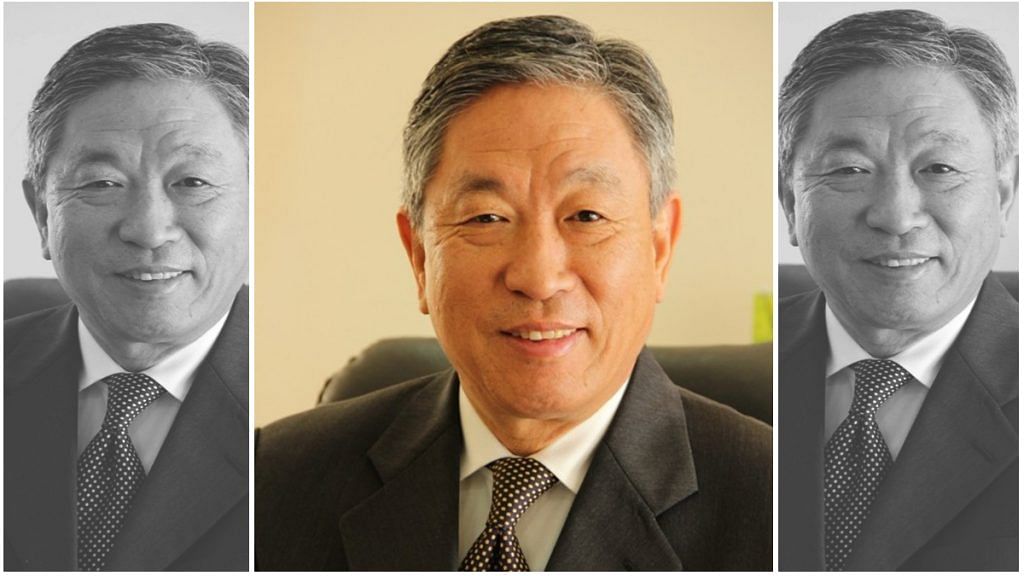New Delhi: China has consistently undermined the ‘One-India Policy’ by way of border conflicts, trade deficit and denting New Delhi’s interests in international organisations due to its “wolf warrior diplomacy”, Chung-Kwang Tien, representative of the Taipei Economic and Cultural Centre in India, has said.
In an exclusive interview to ThePrint over email, Tien said, “China’s record of animosity towards India reflects its wolf warrior diplomacy. It has consistently undermined India’s vital interests in international organizations, territorial sovereignty, border conflict, counter global terrorism, expanded maritime policies in the Indian Ocean and South China Sea and huge trade deficit.”
Tien recalled that during a meeting between former external affairs minister Sushma Swaraj and Chinese Foreign Minister Wang Yi in June 2014, India had told China that if Beijing expects New Delhi to respect its ‘One-China Policy’ then it should also reciprocate and respect ‘One-India Policy’.
“Minister Swaraj’s articulation of the One-India Policy represents many Indians’ long-held suspicion that its friendly geopolitical concessions and gestures toward China have borne no reciprocity. Therefore, the voices of India should ensure the strict reciprocity of gestures and concessions in its political relations with China have constantly been heard,” Tien added.
Under the ‘One-China Policy’, India recognises Taiwan as part of China since 1949 and not as a separate country. New Delhi only maintains economic and cultural ties with Taipei. It didn’t change its stance even after the 1962 war with China.
Tien lauded the Narendra Modi government’s gesture last month of having two BJP MPs, Meenakshi Lekhi and Rahul Kaswan, virtually participate in the swearing-in ceremony of Taiwan President Tsai Ing-wen, in a move that China protested.
“It is with shared spirit that Taiwan and India join the alliance of shared values and concerns for global issues… Taiwan will be an indispensable partner for India and the international community,” the envoy said.
Also read: China lashing out in Ladakh, South China Sea after Covid blame. Can it get away this time?
Taiwan keen to be part of WHO
Chung-Kwang Tien also expressed hope that India will “seriously look into Taiwan’s value of being part” of the World Health Organization (WHO) when New Delhi assumes the chair of the multilateral health body’s executive board.
“We are also confident that, given that Taiwan has received tremendous amount of support from general public, scholars and the media lately in India, Indian government will seriously look into Taiwan’s value of being part of WHO… We are certain India will fairly perform her duty as the chair of the Executive Board of the World Health Organization,” he said.
Taiwan attended the World Health Assembly (WHA), the highest decision-making body of WHO, as an observer from 2009-2016. But since 2016, China has blocked its participation when President Tsai vowed to preserve Taiwan’s independent identity.
With increasing acrimony between the US and China over the Covid-19 pandemic, Washington left no stone unturned to use its diplomatic might for restoring Taiwan’s older status in WHO, before the Donald Trump administration announced the termination of US’ relationship with the multilateral organisation.
Last month, the US had severely criticised WHO for not inviting Taiwan to attend the last WHA meeting, which took place on 17-18 May, accusing WHO of coming “under pressure” from China.
“The Covid-19 situation remains dynamic and being unable to participate in WHO seriously affects Taiwan’s ability to obtain complete and timely information on the virus and on epidemic prevention and to contribute our experience with the countries which have suffered the most under the current devastating situation. WHO should recognize the seriousness of the situation and allow Taiwan’s full participation as soon as possible,” Tien said.
Despite Taiwan’s proximity to China, the island nation has been able to keep the Covid-19 cases under 500 so far, due to their experience in dealing with SARS in 2003, he said.
“We learned the importance of epidemic control and better testing and quarantine, and the need to establish a Central Epidemic Command Center as early as possible. The experience taught Taiwan that acting quickly and ensuring advanced deployment are the keys to preventing the spread of an epidemic,” he added.
Also read: Former diplomat Stobdan’s comments on Dalai Lama spark row, Leh markets shut on Monday
India key to Taiwan’s ‘New Southbound Policy’
According to Chung-Kwang Tien, India remains a key country under their ‘New Southbound Policy’ (NSP).
The NSP was rolled out by President Tsai in 2016 and it is aimed at strengthening Taiwan’s ties with the South Asian region along with Australia and New Zealand.
“India is an exceedingly important country in our New Southbound Policy. Economic cooperation in areas of trade, investment and industry between India and Taiwan has been very close in recent years… We will broaden exchanges and cooperation with regional neighbors in areas such as technology, culture and commerce, and expand in particular our dynamic relationships with India,” he said.
Bilateral trade between India and Taiwan reached $7.05 billion in 2018 from $1.19 billion in 2001, according to the envoy.
“India’s democratic systems, geographical location, and demography dividend are important pillars of economic development and cooperation between Taiwan and India. Taiwan will continue to invest in India in the future,” he added.
China and Taiwan will have to find a way to coexist
On the issue of relations between China and Taiwan ahead, the envoy said the ties have reached a “historical turning point”.
“Both sides have a duty to find a way to coexist over the long term and prevent the intensification of antagonism and differences… We will not accept the Beijing authorities’ use of “One Country, Two Systems” to downgrade Taiwan and undermine the cross-strait status quo. We stand fast by this principle,” he said.
He also said he is willing to engage in a dialogue with China and make more concrete contributions to regional security.
Also read: Nepal in regular touch with India over map row, date for talks not fixed yet: Minister Gyawali
